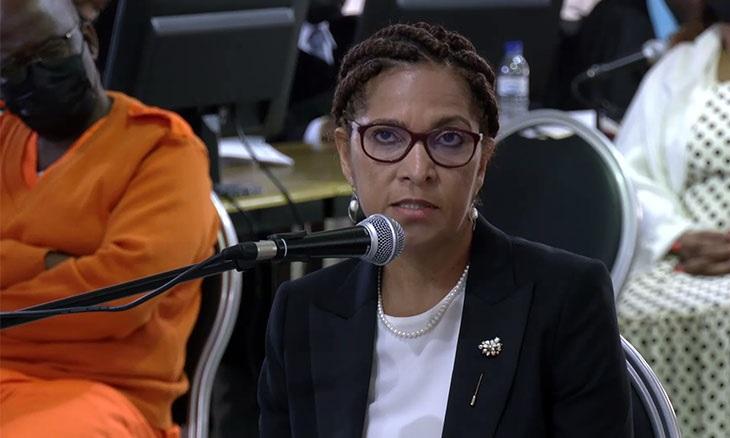Africa-Press – Mozambique. The former head of economic intelligence in the Mozambican security service (SISE), Antonio Carlos do Rosario, intervened directly to ensure that the Bank of Mozambique gave a favourable opinion to the request by the fraudulent company Ematum (Mozambique Tuna Company) for an 850 million US dollar loan from the bank Credit Suisse.
Rosario is one of 19 people on trial before the Maputo City Court on crimes connected with Ematum and two other fake companies, Proindicus and MAM (Mozambique Asset Management).
On Monday Silvina de Abreu, who headed the Bank of Mozambique’s Foreign Department in 2013, told the court of Rosario’s intimidatory tactics.
She said Rosario personally delivered the Ematum dossier to her and her colleague Telma Goncalves, and demanded a speedy opinion on the loan request. He claimed that Ematum was vital, not only as a commercial fishing venture, but also for the country’s defence and security. But Abreu could see no security component in the supply contract which Ematum had signed with its sole contractor, the Abu Dhabi based group, Privnvest.
Rosario “spoke about guns and military equipment, in order to blackmail us emotionally”, she said.
Abreu recalled that he had showed them photos of the then leader of the main opposition party, Renamo, Afonso Dhlakama, beside a white man and a helicopter, supposedly somewhere in the central district of Gorongosa. Mozambique, he said, needed more military equipment to put an end to Renamno’s activities in the central provinces, and this would somehow be achieved through Ematum.
At the time, Dhlakama had returned to the bush and was waging a low level insurgency. This ended in 2014 with an agreement on a cessation of hostilities signed by Dhlakama and the then president, Armando Guebuza, which had nothing to do with Ematum.
Rosario, Abreu recalled, told the bank officials that Ematum was a “very urgent” project. And anyone who got in its way was being “unpatriotic”.
“He continued to put pressure on me, saying that Credit Suisse had deadlines to meet, and we might miss the loan”, she added. “He continued to question our patriotism”.
When Abreu had written her opinion, Rosario demanded that it be changed, by removing all reference to the interest charged by Credit Suisse. This was a demand to far, and Abreu refused.
She said the Ematum documents were delivered on 16 August 2013, and the opinion, suggesting approval, was ready by 22 August,
Abreu thus confirmed the testimony given by Telma Goncalves on Friday night who said she found Rosario’s approach “terrifying”. She recalled Rosario saying “Dhlakama is being financed to wage war in the country and the weaponry in the Ematum package is to deal with this”.
Goncalves believed that, faced with threats and psychological pressure, the central bank officials had no alternative but to agree to the Ematum loan.
Some months earlier (and without any pressure from Rosario this time) Abreu had given a favourable opinion to two requests for loans from Credit Suisse from Ematum’s sister company, Proindicus, one for 372 million dollars and the second for 250 million.
Asked whether she did not find it strange that, just after one huge loan authorization, Proindicus, only three months later, should apply for another one, Abreu said “The justification given at the time, was that they needed to cover other areas, such as the land borders (in addition to the maritime ones), and so they needed to buy more equipment”.
Asked what led her to believe that Proindicus could repay 622 million dollars in the contractual time of seven years, Abreu merely echoed Proindicus’s own figures in its viability study. This forecast revenue of 121 million dollars in the first year of operation, 130 million in the second year, rising to 194 million in the eighth year.
Such figures were a mere fantasy. To collect any revenue, Proindicus needed to sign contracts with companies operating in the Mozambique Channel to protect them against threats such as piracy. Nobody ever signed any contracts with Proindicus, and so the company never generated any revenue.
Abreu had swallowed the conmen’s chatter about “national security”. She had been told that Proindicus was vital to coastal security, and so approval for the loans had to be rushed through – even though this procedure was clearly illegal.
For article 83 of the regulations governing Mozambique’s foreign exchange law states that the Bank of Mozambique may not authorize foreign loans to private companies, if repayment depends on a state guarantee.
And, although all their shareholders are public bodies, Proindicus, Ematum and MAM were all set up as private companies. They also all depended on state guarantees: every cent of the two billion dollars in loans from Credit Suisse and the VTB bank of Russia depended on loan guarantees from the Mozambican government. Without those guarantees, no money would have been forthcoming.
Abreu told the court she had no doubt that the three companies were private. So why had she given a favourable opinion on the loans?, asked prosecutor Sheila Marrengula. Had she discovered some norm that could override the regulations of the foreign exchange law?
No, replied Abreu, but she had been under pressure to sign a letter of approval for what she believed was “a project of strategic importance”. Furthermore, the then Finance Minister, Manuel Chang, had signed the loan guarantees, and surely the Minister would ensure that all the laws would be respected.
The Minister in whom Abreu deposited her trust is the same Manual Chang who is wanted on fraud charges, not only by Mozambique, but also by the United States.
For More News And Analysis About Mozambique Follow Africa-Press






